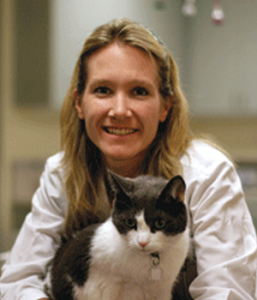-
Adopt
-
Veterinary Care
Services
Client Information
- What to Expect – Angell Boston
- Client Rights and Responsibilities
- Payments / Financial Assistance
- Pharmacy
- Client Policies
- Our Doctors
- Grief Support / Counseling
- Directions and Parking
- Helpful “How-to” Pet Care
Online Payments
Referrals
- Referral Forms/Contact
- Direct Connect
- Referring Veterinarian Portal
- Clinical Articles
- Partners in Care Newsletter
CE, Internships & Alumni Info
CE Seminar Schedule
Emergency: Boston
Emergency: Waltham
Poison Control Hotline
-
Programs & Resources
- Careers
-
Donate Now
 Lisa Maciorakowski, DVM
Lisa Maciorakowski, DVM
Angell General Medicine Service
617-522-7282
Congratulations on your new kitty! Your cute, funny new friend will no doubt bring a lot of joy into your home. In preparation for your new kitty’s arrival and during the first year, there are many things that you can do to help establish the foundation for a happy and healthy life together.
Prior to your new kitty’s actual arrival some “kitten-proofing” should be done. This step shouldn’t be skipped for older cats, which can be just as mischievous as kittens. Many cats will eat plants so they should be placed in locations where they cannot be reached. While most plants will cause only belly upset if eaten, some are fatally toxic. A list of toxic plants, as well as toxic human foods, can be found on aspca.org and should not be in the house at all. Similar to child-proofing a home, breakables should be kept out of reach, trash should have covered lids, cords to blinds should be wrapped up, and window screens should be secured tightly. Caution should also be used with string, plastic, elastic bands, paper, and even certain cat toys, as some cats actually like to eat these things. Baby locks can be used for cabinets that these clever felines sometimes learn to open.
Fortunately most cats are adopted already litter box trained. They should ideally be provided with two litter boxes in separate areas of the house and one on each floor. In a multi-cat household there should be one more litter box than the number of cats in the home. Once a certain style of box and type of litter is chosen it is important not to make an abrupt switch. Sudden changes can upset the cat and they may decide not to use the box at all. The litter box should be kept very clean – scooped daily and a full dump and change of litter ideally every few weeks. It is important to monitor your kitty’s litter box habits closely from the start so that you know what is your kitty’s “normal” behavior. This will make you more likely to catch a subtle urinary problem, like an infection or obstruction, later on. If your cat is ever going in and out of the litter box and not producing urine, he should be brought to a veterinarian for evaluation immediately.
A cat should be fed for their current “life stage”, a kitten on ‘kitten’ food until he is a year old. For the first six months of a kitten’s life the food can be left out but after six months most cats will need to be started on some sort of portion control to try and keep them from becoming overweight, a very common problem for many cats. The food should be AAFCO approved and ideally the first ingredient would be a protein source. Your vet can help guide your food selection decision and determine your cat’s BCS (body condition score). While most veterinary nutritionists would agree that canned food is best for cats, a mixture of both canned and dry is also good for their teeth and provides a more interesting variety. Along with food, remember to provide your kitty with many fresh, clean water bowls. Making water available in at least a few locations throughout the home will encourage your cat to drink. Staying well hydrated will help in the prevention of possible urinary issues.
All newly adopted cats should be brought to a veterinarian within a couple weeks of adoption for a full physical examination even if they are older and already up to date with their vaccinations. Kittens will need to have at least a few visits. They will get vaccines at 8, 12, and 16 weeks of age. The particular vaccines will be discussed at the first visit. Most indoor cats will get Distemper (FVRCP) and Rabies vaccines. Outdoor cats may also get a Leukemia vaccine. Most cats do great after their vaccines although some sleepiness afterward is common, which may be attributed to the excitement of the visit as much as a side effect of the vaccine. But just like with humans, it’s always important to monitor for any less common side effects like soreness or sickness. If there is ever any concern about how they are feeling after a vaccine then call your vet or bring them in to be rechecked.
A stool sample should be brought in to the first visit so that it can be evaluated for intestinal parasites. Most often a series of deworming medication will be given regardless since parasites are so common. While most parasites are species-specific, there are some that can occasionally affect humans so it is always important to use good hygiene – like washing hands after cleaning litter boxes. A blood test for Felv and FIV will also likely be recommended. Those are two viral diseases that cats can either be born with or get from contact with infected cats. Even if the test was already done at a shelter prior to adoption, rechecking again after about six months of age is always recommended.
Spaying or neutering usually is done around six months of age (the timing is important to prevent mammary masses in females and spraying in males), if not already done prior to adoption. In addition to rechecking their viral status, baseline/pre-surgical blood is usually recommended prior to spaying/neutering surgery to make sure that they are safe candidates for anesthesia and to provide a baseline to which future results can be compared. It will check their kidneys, liver, blood sugar, white and red blood cell counts and electrolytes. When cats are older it is ideal to do this lab work for yearly monitoring and, of course, anytime they are acting unwell. As with humans, it is also important for your kitty to have an exam at least annually.
To help your kitty settle in at home during those first days, keep him in a smaller area of the home at first. This might help make him feel more comfortable and his world can gradually be expanded for exploration. Feliway (a natural cat pheromone spray or diffuser) can be used to help keep him relaxed during this transition.
The first few months are a very important time to get your kitty used to handling and holding and lots of other different things. At their first vet visit you can get a demonstration on handling feet, nail trimming, checking/cleaning out ears, brushing their coat, and daily teeth brushing technique. Treats can be used as a reward for positive reinforcement of good behaviors. Also, if the carrier is left out he may become desensitized to its presence and may feel comfortable playing and sleeping in it. Then he might not assume that it is only used to take him to the vet and so chances of getting him into it will be easier.
Play is a very important part of your kitty’s daily activities. Although it may be tempting, you should not allow them to use any of your body parts as a toy. If he tries to bite your toes or attack your fingers they should be ignored and redirected with an appropriate toy. Any reaction, even a reprimanding one, will be exciting for them and encourage them to persist. Plenty of scratching posts (horizontal and vertical) and different types of toys should be provided. Kitties that play hard can be expected to sleep a lot in between playing as well. In an attempt to keep their playtime from coinciding with your nighttime sleep, you can try to play with them and tire them out earlier in the evening. The website https://indoorpet.osu.edu/cats is a good resource for ways in which to provide environmental enrichment to your indoor kitty.
While it is safest to have your cat stay indoors, if he must go out, make sure that he is always up to date on the appropriate vaccinations, on preventatives and ideally kept inside overnight. Cats can get diseases from fleas and ticks, heartworm disease from mosquitoes, and intestinal parasites from feces. In order to prevent this from happening it is very important to discuss preventative options with your veterinarian. Even indoor cats, depending on their environment, may benefit from some of these preventatives, which typically come in the form of oral and/or topical medications. If your kitty didn’t get microchipped prior to adoption, you can discuss this option with your vet as well. Any lost cat brought into a hospital or shelter will be scanned and if this small metal chip is detected under their skin then they can be reunited with their owner. This chip is even a good idea for indoor cats.
Enjoy getting to know the unique personality and quirks of your new kitty. If you were not already a cat person then you will most certainly be converted in no time. Take lots of photos…. they grow up fast! Remember that prevention is the best medicine but most importantly that “there is no greater gift than the love of a cat”. – Charles Dickenson.
For information about Angell’s General Medicine service, please visit www.angell.org/generalmedicine or call 617-522-7282.

